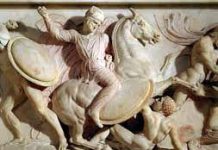Herodotus | The Persian Wars | A Review. A focused review of The Persian Wars by Herodotus, highlighting its themes, context, and lasting historical significance.
Herodotus ‘The Persian Wars’-A Review
“The Persian Wars” is a historical account of the conflict between Greece and the Persian Empire, written by the ancient Greek historian Herodotus. The book is divided into nine chapters, each of which covers a specific period of the wars.
One of the most notable features of the book is the way in which Herodotus blends historical fact with myth and legend. While this may be viewed as a weakness by some modern readers, it was a common practice in ancient historiography. As a result, “The Persian Wars” provides not only a detailed account of the battles and political machinations of the time, but also a window into the cultural and religious beliefs of the ancient Greeks.
The first two chapters of the book provide background information on the Persian Empire and the Greeks, respectively. Herodotus describes the origins of the Persian Empire, including the reign of Cyrus the Great and the conquests of his successors. He also provides an overview of Greek history up to the time of the Persian Wars, including the rise of Athens and Sparta.
The next several chapters cover the wars themselves. Herodotus provides a detailed account of the battles of Marathon, Thermopylae, Salamis, and Plataea, among others. He describes the tactics used by both sides, the commanders and their motivations, and the outcome of each battle. He also provides insight into the political and cultural factors that shaped the course of the war.
One of the strengths of the book is Herodotus’ attention to detail. He provides information on the geography of the region, the various city-states involved in the conflict, and the political and economic systems of both the Greeks and Persians. This level of detail allows the reader to gain a deeper understanding of the complex social and political factors that contributed to the wars.
Another strength of the book is its narrative style. Herodotus is a master storyteller, and he weaves together various threads of the narrative into a cohesive whole. He is particularly adept at building tension and suspense, particularly in his descriptions of the battles themselves.
However, there are some weaknesses to the book. As noted earlier, Herodotus includes many elements of myth and legend, and it can be difficult for the modern reader to separate fact from fiction. In addition, Herodotus’ bias towards the Greeks is evident throughout the book, and he tends to portray the Persians as barbaric and uncivilized.
In conclusion, “The Persian Wars” is a fascinating and informative book that provides a detailed account of one of the most significant conflicts in ancient history. Despite its flaws, it remains an essential text for anyone interested in the history of the ancient world. 0 0 0.
Herodotus | The Persian Wars | A Review
N.B. The article originally belongs to the book entitled ‘Reviews of Some Iconic Travelogues‘ by Menonim Menonimus.
Books of Literary Criticism by M. Menonimus:
- World Short Story Criticism
- World Poetry Criticism
- World Drama Criticism
- World Novel Criticism
- World Essay Criticism
- Indian English Poetry Criticism
- Indian English Poets and Poetry Chief Features
- Emily Dickinson’s Poetry-A Thematic Study
- Walt Whitman’s Poetry-A Thematic Study
- Critical Essays on English Poetry
- Tawfiq al-Hakim’s Novel: Return of the Spirit-An Analytical Study
- Tawfiq al-Hakim’s Novel: ‘Yawmiyyat Naib Fil Arayaf’-An Analytical Study
- Analytical Studies of Some Arabic Short Stories
- A Brief History of Arabic Literature: Pre-Islamic Period (500 AD-622 AD)
- A Brief History of Arabic Literature: Early Islamic Period (622 AD-661 AD)
- Reviews on William Shakespeare’s Works
- Reviews of John Milton’s Literary Works
- Reviews of Some Iconic Travelogues …
Additional Searches:
- 15 Travel Books
- Travelogues
- Chronicles of Travellers
- Foreign Travellers in Medieval India
- Arabian Travellers
- Greek Travellers
- Chinese Travellers
- Fa-hien
- Ibn Battuta
- Herodotus








